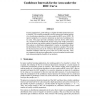203 search results - page 19 / 41 » On interval fuzzy negations |
TFS
2010
13 years 4 months ago
2010
Abstract--Higher order fuzzy logic systems (FLSs), such as interval type-2 FLSs, have been shown to be very well suited to deal with the high levels of uncertainties present in the...
IJCNN
2008
IEEE
14 years 4 months ago
2008
IEEE
— Negative Correlation Learning (NCL) has been showing to outperform other ensemble learning approaches in off-line mode. A key point to the success of NCL is that the learning o...
FLAIRS
2007
14 years 9 days ago
2007
In this paper we shall introduce an approach that forms a basis for temporal data mining. A relation algebra is applied for the purpose of representing simultaneously dependencies...
FSS
2008
13 years 10 months ago
2008
In this work we give a state-of-the-art review of two of the most established classes of fuzzy implications, viz., (S, N)- and R-implications. Firstly, we discuss their properties...
NIPS
2004
13 years 11 months ago
2004
In many applications, good ranking is a highly desirable performance for a classifier. The criterion commonly used to measure the ranking quality of a classification algorithm is ...

